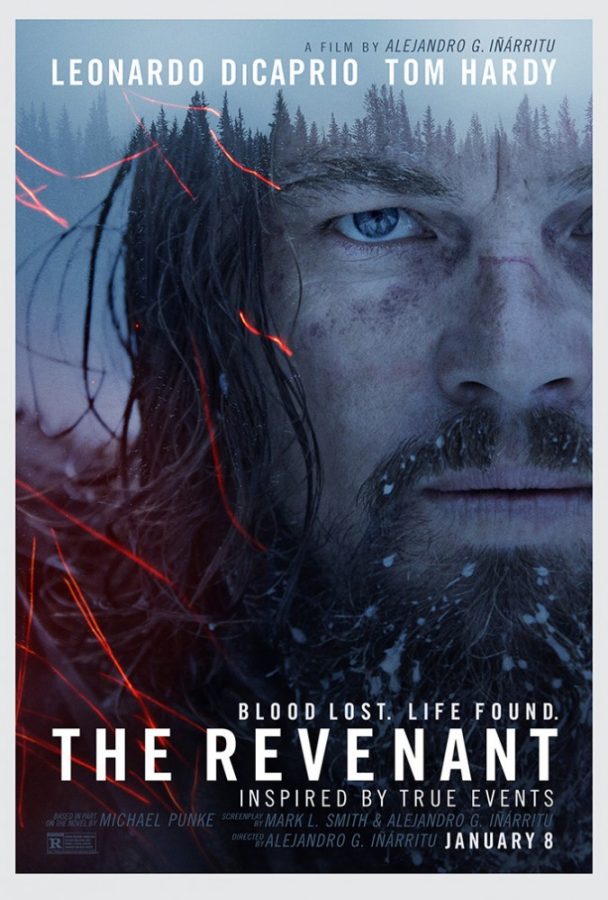On Jan. 10, the Golden Globe Awards aired and some of the big moments that blew up on social media were Mel Gibson putting host Ricky Gervais in a ‘friendly’ headlock and Leonardo DiCaprio giving a surprised look of horror as Lady Gaga walked past him.
In terms of the actual awards, “The Revenant” was the big winner, with DiCaprio earning the Golden Globe for Best Actor in a Drama Motion Picture, Alejandro González Iñárritu winning Best Director and the film taking home the most prestigious award of the night, Best Drama Motion Picture, beating out the likes of “Mad Max: Fury Road,” “Room,” “Carol” and “Spotlight.”
The film deserves the high praise, in particular, for its stunning visuals of the American wilderness, the performances from DiCaprio and Tom Hardy, the sheer scale and the grueling emotional range of the film.
DiCaprio plays Hugh Glass, the navigator for a party of hunters and trappers who are mining the untapped wilderness of the Louisiana Purchase for furs to sell. He’s a relatively quiet man, choosing not to get into an argument with John Fitzgerald (Hardy) when John ridicules Hugh’s Native American son, Hawk (Forrest Goodluck).
Hardy brings that idiosyncratic murmuring and affectation of speech to John that’s been seen in other characters Hardy has previously played, like Forrest Bondurant in “Lawless” and “Mad” Max Rockatansky. As always, he’s a presence on screen.
Hugh scorns his son for raising a fuss with John: “They don’t hear your voice; they just see the color of your face.”
There’s nothing that makes the conflict between the white man and the Native Americans more apparent than the opening set piece when the Arikara tribe ambushes the hunting party. Iñárritu and cinematographer Emmanuel Lubezki, who teamed up together on 2014’s “Birdman,” which was filmed and edited to look as if it was done in one seamless take, have employed what they honed on their last picture.
In long, sweeping takes the battle plays out, with arrows whizzing back and forth, sometimes unexpectedly entering the frame and into the eye of an unlucky subject. The camera will follow someone and when that person meets a grisly end, it will pick up on someone new without missing a beat; a graceful, chaotic baton pass of cinematography.
Now, none of those who become battlefield fodder will serve as our revenant, a person who has returned from an extended absence, even supposedly from the dead. That duty falls to Hugh, who is mauled by a bear in the film’s most brutal sequence. Although he survives, he’s on death’s door and slowing the expedition down.
Hawk and John volunteer to watch over Hugh until his inevitable death. A betrayal occurs, however, and Hugh is left alone to die.
As Glass, DiCaprio must literally crawl his way out of his own grave, his body broken. Thus begins his harrowing quest for vengeance and survival in an unforgiving winter.
It’s largely a one-man show for DiCaprio as his character clings to life and navigates an untamed America, rife with dangers of both man and nature.
I can’t recall the last time a movie portrayed the will to survive in such a raw, gruesome light. Indeed, at times it seems ridiculous what befalls Hugh. How would you like to survive a bear mauling, only to have your horse fall off a cliff? DiCaprio, as usual, is phenomenal; his grimaces become the audience’s.
What makes his struggle for revenge all the more evocative is that it’s framed against stark white landscapes and towering mountains, captured beautifully by Lubezki, who only used natural light while filming.
Hugh’s struggle is simultaneously heightened by the setting and also given perspective by it. This is the journey of a single human in a vast world where God is present. I’m almost keen to say that the ending feels purposely underwhelming to drive home this reality, but I won’t go that far. Hugh’s choices at the film’s conclusion feel hollow and not as cathartic as a journey of such extremes demands.
Despite its relative shortcomings in narrative, the vast scale and beautiful imagery of “The Revenant,” anchored by Dicaprio’s performance, make the film a harrowing experience.
Grade: A-
Follow Alex Guyton on Twitter









